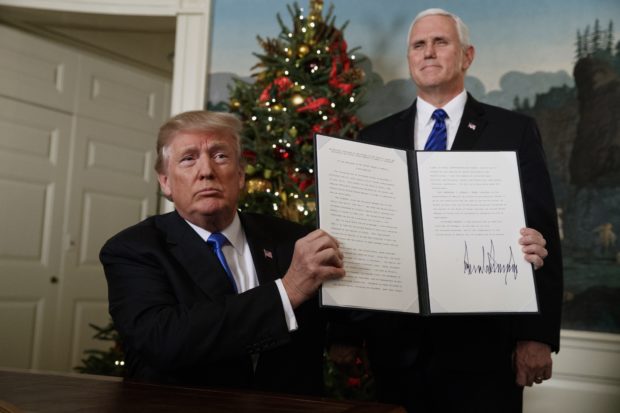
IT’S OFFICIAL US President Donald Trump holds up a newly signed proclamation to officially recognize Jerusalem as the capital of Israel. At right is Vice President Mike Pence. —AP
WASHINGTON—Defying dire, worldwide warnings, US President Donald Trump on Wednesday broke with decades of US and international policy by recognizing Jerusalem as Israel’s capital.
Despite urgent appeals from Arab and European leaders and the risk of anti-American protests and violence, Trump declared that he was ending an approach that for decades had failed to advance the prospects for peace.
He also for the first time personally endorsed the concept of a “two-state solution” for Israel and the Palestinians, provided both sides agree to it.
“I have determined that it is time to officially recognize Jerusalem as the capital of Israel,” he said in a White House address, calling it “overdue” and in the best interests of the United States.
According to him, recognition acknowledged the “obvious” that Jerusalem is the seat of Israel’s government despite the disputed status that is one of the key elements in the Israeli-Palestinian conflict.
‘Recognition of reality’
“This is nothing more or less than the recognition of reality,” he said.
Trump also directed that the US Department of State begin the process of moving the US Embassy from Tel Aviv to Jerusalem as required by US law.
Trump maintained that his decision would not compromise the city’s geographic and political borders, which will still be determined by Israel and the Palestinians.
Israeli Prime Minister Benjamin Netanyahu hailed Trump’s announcement as a “historic landmark,” but other close Western allies of Washington such as Britain and France were critical.
The European Union and United Nations also voiced alarm at Trump’s decision, which was condemned by Arabs and Muslims across the Middle East.
Appeal for calm
France rejected the “unilateral” decision while appealing for calm in the region.
Britain said the move would not help peace efforts and Jerusalem should ultimately be shared by Israel and a future Palestinian state.
Germany said Jerusalem’s status could be resolved only on the basis of a two-state solution.
Netanyahu said in a prerecorded video message that it was “an important step toward peace” and it was “our goal from Israel’s first day.”
He added that any peace accord with the Palestinians would have to include Jerusalem as Israel’s capital and he urged other countries to follow Trump’s example.
Israel deems Jerusalem its eternal and indivisible capital dating to antiquity, and its status is one of the thorniest barriers to a lasting Israeli-Palestinian peace.
Six-Day War
Israel captured East Jerusalem in the 1967 Six-Day War and annexed it in a move not recognized internationally.
Palestinians claim East Jerusalem for the capital of an independent state they seek.
Jerusalem includes the holiest ground in Judaism. It’s also home to Islam’s third-holiest shrine and major Christian sites, and any perceived harm to Muslim claims to the city has triggered protests in the past, in the Holy Land and beyond.
Ahead of Trump’s speech, Arab and Muslim leaders spoke about the potential for violence.
In Gaza, hundreds of Palestinian protesters burned American and Israeli flags.
They also waved Palestinian flags and banners proclaiming Jerusalem as their “eternal capital,” language that Israelis similarly use for their nation.
Palestinian President Mahmoud Abbas, in a prerecorded speech, said Jerusalem was the “eternal capital of the State of Palestine” and that Trump’s move was “tantamount to the United States abdicating its role as a peace mediator.”
The last round of US-brokered talks foundered in 2014 over issues including Israeli settlement expansion in the occupied West Bank and Israeli accusations of Palestinian incitement to violence and refusal to recognize it as a Jewish state.
‘Flagrant aggression’
The Palestinian Islamist group Hamas, which has dominated Gaza since soon after Israel ended a 38-year occupation in 2005, said Trump had committed a “flagrant aggression against the Palestinian people.”
Egypt, which forged the first Arab peace deal with Israel in 1979, brushed off Trump’s decision and said it did not change Jerusalem’s disputed legal status.
Jordan said Trump’s action was “legally null” because it consolidated Israel’s occupation of East Jerusalem.
Lebanese President Michel Aoun said Trump’s decision was dangerous and threatened the credibility of the United States as a broker of Middle East peace.
Qatar’s foreign minister, Sheikh Mohammed bin Adbulrahman al-Thani, said Trump’s undertaking was a “death sentence for all who seek peace” and called it “a dangerous escalation.”
Turkey said Trump’s move was “irresponsible.”—WITH REPORTS FROM AP